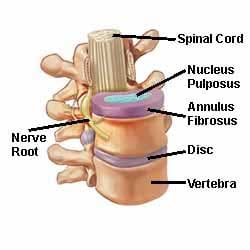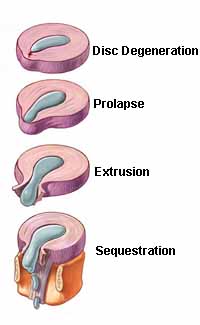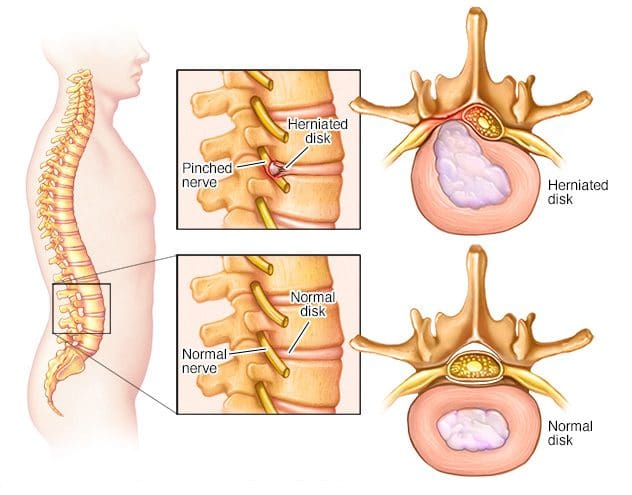Herniated Disc Treatment El Paso, Texas
Herniated Disc Treatment: Disc herniation is among the most frequent causes of sciatica and back pain. A herniated disc refers to the nucleus pulposus (HNP) or (gel-substance) that breaks through the annulus fibrosus (exterior outer tire-like shell) of an intervertebral disc (spinal shock absorber).
 Recognizing Disc Herniation:
Recognizing Disc Herniation:
The back consists of several bones vertebrae. Every one of these bones is padded by a disc, which absorbs shock and enables flexibility. An opening can form, and the soft center of the spinal disc comes out. This can irritate the nerves and spinal cord, which causes back pain, numbness, weakness, and arm or leg pain. This injury happens most often in the lower back or the cervical spine. Disc herniation causes:
- Natural wear and tear.
Disc herniation is often the result of gradual, aging-related wear and tear called disc degeneration. As one age, the spinal discs lose some of their water content. This makes them less flexible and more prone to tear or rupture with even a minor strain or twist.  Spinal injury
Spinal injury
An injury to the spine can lead to cracks in the disc’s outer layer, which can open the structure.- Lifting heavy items
Using the back muscles instead of the leg and thigh muscles to lift large, heavy objects can lead to a herniated disc, twisting and turning while lifting. It’s most common in the lumbar spinal column or lower spine. - Weight: Excess body weight causes extra stress on the discs in your lower back.
- Occupation: People with physically demanding jobs have a greater risk of back problems. Repetitive lifting, pulling, pushing, bending sideways, and twisting also may increase your risk of a herniated disc.
- Genetics: Some people inherit a predisposition to developing a herniated disc.
Most people cannot pinpoint the exact cause of the herniated disc.
Although rare, a traumatic event, i.e., a fall or a blow to the back, can cause a herniated disc.
Symptoms:

Most herniated discs occur in the lower back (lumbar spine) and occur in the neck (cervical spine). The most common signs and symptoms of a herniated disc are:
Arm or leg pain: If the herniated disc is the lower back, one will typically feel the most intense pain in the buttocks, thigh, and calf. It may also involve part of the foot. If the herniated disc is in the neck, the pain will typically be most intense in the shoulder and arm. This pain may shoot into the arm or leg when coughing, sneezing, or moving the spine into certain positions.
Numbness or tingling: People who have a herniated disc will often experience numbness or tingling in the part of the body that serves the affected nerves.
Weakness: Muscles that serve the affected nerves tend to weaken. This can cause stumbling or impair the ability to lift or hold items.
One can also have a herniated disc without knowing it. Herniated discs sometimes show up on spinal images of people who have no symptoms of a disc problem.
Complications
The spinal cord does not extend into the lower portion of the spinal canal. Just below the waist, the spinal cord separates into a group of long nerve roots (cauda equina) that resemble a horse’s tail. Sometimes, however rarely, disc herniation can compress the entire cauda equina. Emergency surgery may be required to avoid permanent weakness or paralysis.
It’s time to seek emergency medical attention when:
- Worsening symptoms: Pain, numbness, or weakness may increase to the point that daily activities cannot be done.
- Bladder or bowel dysfunction: People with cauda equina syndrome may become incontinent or have difficulty urinating even with a full bladder.
- Saddle anesthesia: A progressive loss of sensation that affects the areas that would touch a saddle, i.e., the inner thighs, back of legs, and around the rectum.
Diagnosis:
To determine if a herniated disc is causing these symptoms, our therapists will start with a physical exam. They will discuss the current symptoms, evaluate the spine for tenderness and pain. After that, the legs are placed into various positions that can offer insight into what is happening with the spine. If necessary, an MRI can be ordered to confirm the location of the herniated disc and create a baseline image before therapy. This is to identify which nerves are involved, start therapy, track progress and recovery after treatment.
Premier Herniated Disc Treatment

For herniated disc treatment Dr. Alex Jimenez has discovered the treatment that helps.
These approaches provide pain relief, are promising alternatives to our patients, and help prevent back pain and downtime related to back operation.
Prevention
To help in the prevention a herniated disc treatment:
- Exercise: Strengthening the core muscles helps in the stability and support of the spine.
- Maintain good posture: Proper posture reduces the pressure on the spine and discs. Keep the back straight and aligned, particularly when sitting for long periods. Lift heavy objects properly, use your legs and not your back to do the heavy lifting work.
- Maintain a healthy weight: Excess weight puts more pressure on the spine and discs, making them more susceptible to herniation.
Home Herniated Disc Treatment:
Home remedies for disc herniation can be effective in relieving pain. Included are non-steroidal anti-inflammatory drugs (NSAIDs) such as ibuprofen (Advil, Motrin) and naproxen sodium (Aleve). Also is the application of heat and ice. Alternating heat and ice are very effective for pain relief for many people. Modifying physical activity is also important. This includes avoidance of activities that aggravate pain and may worsen the nerve impingement. Complete inactivity is unnecessary as they hinder recovery, and no movement is not advised.
Chiropractic Herniated Disc Treatment
Post Disclaimer
Professional Scope of Practice *
The information on this blog site is not intended to replace a one-on-one relationship with a qualified healthcare professional or licensed physician and is not medical advice. We encourage you to make healthcare decisions based on your research and partnership with a qualified healthcare professional.
Blog Information & Scope Discussions
Welcome to El Paso's Premier Wellness and Injury Care Clinic & Wellness Blog, where Dr. Alex Jimenez, DC, FNP-C, a board-certified Family Practice Nurse Practitioner (FNP-BC) and Chiropractor (DC), presents insights on how our team is dedicated to holistic healing and personalized care. Our practice aligns with evidence-based treatment protocols inspired by integrative medicine principles, similar to those found on this site and our family practice-based chiromed.com site, focusing on restoring health naturally for patients of all ages.
Our areas of chiropractic practice include Wellness & Nutrition, Chronic Pain, Personal Injury, Auto Accident Care, Work Injuries, Back Injury, Low Back Pain, Neck Pain, Migraine Headaches, Sports Injuries, Severe Sciatica, Scoliosis, Complex Herniated Discs, Fibromyalgia, Chronic Pain, Complex Injuries, Stress Management, Functional Medicine Treatments, and in-scope care protocols.
Our information scope is limited to chiropractic, musculoskeletal, physical medicine, wellness, contributing etiological viscerosomatic disturbances within clinical presentations, associated somato-visceral reflex clinical dynamics, subluxation complexes, sensitive health issues, and functional medicine articles, topics, and discussions.
We provide and present clinical collaboration with specialists from various disciplines. Each specialist is governed by their professional scope of practice and their jurisdiction of licensure. We use functional health & wellness protocols to treat and support care for the injuries or disorders of the musculoskeletal system.
Our videos, posts, topics, subjects, and insights cover clinical matters and issues that relate to and directly or indirectly support our clinical scope of practice.*
Our office has made a reasonable effort to provide supportive citations and has identified relevant research studies that support our posts. We provide copies of supporting research studies available to regulatory boards and the public upon request.
We understand that we cover matters that require an additional explanation of how they may assist in a particular care plan or treatment protocol; therefore, to discuss the subject matter above further, please feel free to ask Dr. Alex Jimenez, DC, APRN, FNP-BC, or contact us at 915-850-0900.
We are here to help you and your family.
Blessings
Dr. Alex Jimenez DC, MSACP, APRN, FNP-BC*, CCST, IFMCP, CFMP, ATN
email: coach@elpasofunctionalmedicine.com
Licensed as a Doctor of Chiropractic (DC) in Texas & New Mexico*
Texas DC License # TX5807
New Mexico DC License # NM-DC2182
Licensed as a Registered Nurse (RN*) in Texas & Multistate
Texas RN License # 1191402
ANCC FNP-BC: Board Certified Nurse Practitioner*
Compact Status: Multi-State License: Authorized to Practice in 40 States*
Graduate with Honors: ICHS: MSN-FNP (Family Nurse Practitioner Program)
Degree Granted. Master's in Family Practice MSN Diploma (Cum Laude)
Dr. Alex Jimenez, DC, APRN, FNP-BC*, CFMP, IFMCP, ATN, CCST
My Digital Business Card


